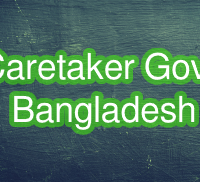Caretaker Government in Bangladesh
Introduction:
Democratic
stability is the yardstick of the development of a democratic country.
Democracy in the true sense depends on good behavior, good manners, human
value, tolerance, and political consciousness of the people of a country. And
only the honest elected government may ensure the entire development of a
country. The precondition for forming a real and all-accepted government is the election. In an underdeveloped country like Bangladesh political parties want
to win elections at any cost. So the election system faces many problems like
rigging, unfair means, partiality, etc. Again every often the party in
opposition cannot rely on the neutrality of holding an election by the party
power. To overcome this sort of problem an alternative government system was
felt necessary for holding a free, fair, peaceful, and impartial election. This
alternative system of government is called a non-party caretaker government.
Concept
of caretaker Govt.: A caretaker govt.
which is not concerned with any political party. It must be in power for a
fixed time. A caretaker govt. must take members from all walks of life who are
non-political and impartial to everybody. The concept of caretaker govt. is of
recent origin in the political arena of our land. Bangladesh emerged as an
independent state thirty-four years ago. One of the basic principles of this
newly-born state is democracy. The desired form of govt. was adopted as a parliamentary government. Our political system was based on the Pakistani and
Indian models. The question then arose about the necessity of forming a
caretaker government.
Its
creation in Bangladesh: During the second world war the urgency of the caretaker govt. was felt first. But the urgency of this type of govt. is felt
nowadays in LDCs. At first caretaker govt. was formed in Bangladesh. It was
for the first time in 1990 when our national election was held under the
caretaker govt. the next election was held under the same type of govt. in
1996. Following the model of our caretaker govt. the national election was held
under a caretaker govt. in Pakistan. Namibia and Cambodia in 1993. The caretaker
govt. has some certain, responsibilities:
To re-establish democracy and preserve law and discipline. To hold an impartial election and to develop
administration. To form an Advisers Council and to defend the constitution of
the country. To swear the elected members of the parliament after the election. Not
to perform anything but the functions related to the election. To account for
its activities to the President.
First
caretaker Govt. in Bangladesh: In Bangladesh the caretaker govt. was
formed on two occasions after severe political unrest and incredible
turmoils. For the first time the then Chief Justice Shahab Uddin Ahmed was
unanimously chosen as the Chief Advisor of the caretaker govt. He peacefully
governed the country from 6 December 1990 to March 1991 until Begum Khaleda Zia
took an oath as the head of the Government and remained acting president till
October 9, 1991, when President Abdur Rahman Biswas took the formal charge.
Second
caretaker Govt. in Bangladesh: for the second time Justice Mohammad
Habibur Rahman was made head of the caretaker govt. on 30 March 1996. He was in
office till 23 June 1996 when the Awami League government came to power.
Third
caretaker Govt. in Bangladesh: Justice Latifur Rahman was the chief
advisor of the third caretaker govt. of Bangladesh which was formed in 2001 and he
executed the Parliament election. Through the election, Bangladesh Nationalist
Party (BNP) led by Begum Khaleda Zia came to power. Begum Khaleda Zia was
honoured as the chair of the prime minister.
Fourth
caretaker Govt. in Bangladesh: in 2006, the ex-governor of Bangladesh
Bank, Mr. Fakhruddin Ahmed took the position of the chief advisor of the fourth
caretaker govt. of Bangladesh. He captured the position for as long as two
years breaking the law of the constitution and was compelled to hold the
national election in 2008. Through this election, Bangladesh Awami League led by
Sheikh Hasina came to power. She became the prime minister and has been
executing the schedule to date.
Caretaker
Govt. and democracy: Democracy is an ideal form of govt. It is really
unfortunate that we want democracy and rise high-sounding slogans for democracy
but we do not follow its principles and ideals. Even the caretaker govt. will
fail to ensure free and fair elections in our country if we cannot rise above
the narrowness of mind.
Necessity
of caretaker govt.: One of the basic principles of democracy is respect for
others. If this principle together with tolerance is carried into practice, the
necessity of a caretaker govt. will remain no more. Otherwise, we will be
there, where we are and there will be no hope for us to live a better life.
Our
Politics and Caretaker govt.: it is constitutionalized that after the fixed
tenure of the elected govt. they must surrender the power of the caretaker govt.
for holding free and fair parliamentary elections. Our politics has been
vibrated by the caretaker government.
Conclusion: Although the merits of the
election under a caretaker govt. satisfy us, it has also its critics. Some
political leaders do not appreciate the activities of the caretaker govt. in
connection with the fair election. In fine, the election under caretaker govt. has
been praised highly at home and abroad. It is accepted by the people of our
country.

